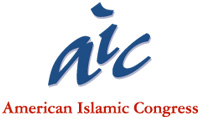Founded late in 2001, the American Islamic Congress (AIC) is a 501(c)(3) non-profit organization based in the United States. AIC is a non-religious, civil rights organization whose stated goal is to build interfaith and inter-ethnic understanding.[2] It receives significant funding from the U.S. government.[3]
 | |
| Established | November 2001 |
|---|---|
| Founder | Zainab Al-Suwaij, others |
| Type | 501(c)(3) non-profit organization |
| Location | |
Executive Director | Zainab Al-Suwaij |
| Harriet Fulbright; Sa'ad Eddin Ibrahim; Khaleel Mohammed | |
| Website | aicongress |
History
editAIC was founded in November 2001 by a group of American Muslims to promote tolerance following the September 11, 2001 attacks.[4] AIC's co-founder, Zainab Al-Suwaij, was a prominent public supporter of the 2003 U.S. war with Iraq.[5][6] In 2004, AIC was one of three groups who shared a $10 million U.S. Department of State grant to carry out democracy training of Iraqi women.[7]
The organization is based in Washington, D.C. and also maintains bureaus in Boston, Massachusetts Cairo, Egypt and Basra, Iraq. AIC co-founder Al-Suwaij is the group's Executive Director.
U.S. Programs
editThe American Islamic Congress started a student-led initiative two years ago dubbed "Project Nur." Project Nur has over 70 chapters in campuses across the nation, and is rapidly expanding. The chapters work to combat stereotypes and promote inter-faith understanding on college campuses. Project Nur, in cooperation with the John Templeton Foundation, hosts the Science and Islam dialogue series, which explores the intersection of Muslim faith and science.[8]
AIC's Boston Center, located on Newbury Street in Boston, Massachusetts, organizes interfaith activities, serves as a resource for other non-profits and hosts cultural events, such as concerts, art exhibitions and film screenings, as well as human and civil rights panel discussions.[9]
AIC's D.C. Center focuses on advocacy, engagement and education, serving as the base for AIC's government and NGO relations. AIC represents the American Muslim constituency on Capitol Hill and supports legislation that promotes international religious and civil freedoms. In 2011, AIC was a critical voice campaigning for the re-authorization of the United States Commission on International Religious Freedom.[10] A significant part of the AIC's push for reauthorization included a media campaign, spearheaded by John T. Pinna, the Director of Government & International Relations at the time. Pinna and the AIC sent out a "pitch" about the bill to over 30 publications. The campaign gained traction with a story running in the Washington Post and TIME magazine contacting Senate offices about the USCIRF bill. Within 24 hours after those calls, Senator Richard Durbin proposed amendments, the "call back" was rescinded and the bill quickly passed the Senate by unanimous consent.[11]
International Programs
editIn Egypt, AIC hosts the Cairo Human Rights Film Festival and conducts a civic education prohectm Fahem Haqi (I Know My Rights). AIC has also translated and distributed "The Montgomery Story," a Martin Luther King comic book that describes the 1958 bus boycott and the power of non-violence. The comic book was influential during the events of the Arab Spring.[12]
In 2008, AIC, in collaboration with CureViolence, began the Ambassadors for Peace program in Iraq.[13] The program aims to peacefully resolve conflicts through the mediation of local outreach workers.
In June 2010, AIC launched a blog focusing on women's right in the Middle East. The blog, called "Drafting a New Story: Women's Rights in the Middle East" features new stories, political cartoons, video interviews, and artwork with an emphasis on women's rights.
AIC began working in Tunisia in 2011 with the social entrepreneurship program Tune in Tunisia. The program offers young social entrepreneurs microgrants to lead civil society projects in their local communities.
AIC also holds an annual essay writing contest focused on civil rights in the Middle East, the Dream Deferred Essay Contest. In May 2012, the best essay submissions from the Middle East and North Africa were published in an anthology called Arab Spring Dreams.[14]
AIC advocates for religious and civil freedoms at large in the Middle East. In 2007, when Haleh Esfandiari was imprisoned in Evin Prison in Iran, the American Islamic Congress created the site freehaleh.org to petition for her release.[15]
Funding
editFrom its early days, the AIC has received a significant portion of its funding from the U.S. government.[3][16]
External links
editReferences
edit- ^ "AIC's Mission and Principles". American Islamic Congress. Archived from the original on 2017-07-10. Retrieved 3 August 2017.
- ^ "AIC's Story". Archived from the original on 2012-08-24. Retrieved 2012-10-31.
- ^ a b (PDF) 2010 Annual Report of the American Islamic Congress.
- ^ Wax, Emily (July 12, 2012). "Moderate American Muslim tries to navigate a deeply divided community". The Washington Post.
- ^ Iraqi people yearn to taste freedom again Zainab Al Suwaij, USA Today, January 13, 2003
- ^ "RNC Al-Suwaij Transcript". Fox News. August 30, 2004. Archived from the original on August 13, 2013. Retrieved June 3, 2013.
- ^ Iraqi Women Receiving Democracy Training Through U.S. Grants Archived 2005-02-22 at the Wayback Machine United States Diplomatic Mission to Italy, December 28, 2004
- ^ Farrell, John (May 25, 2012). "Meeting The Challenge Of Science For Muslims On Campus". Forbes.
- ^ "Muslim Center Opens In Back Bay". The Boston Globe.
- ^ "Religious Freedom No Match For Washington Gridlock?". Christian Science Monitor. 13 December 2011.
- ^ Mitchell, Greg (21 August 2012). "Advocacy Coalitions and Legislative Lobbying for International Religious Freedom". The Review of Faith & International Affairs. 10 (3): 51–57. doi:10.1080/15570274.2012.706102.
- ^ "MLK Comic Book Helped Inspire Arab Spring".
- ^ "International Partners".
- ^ "New Arab Spring anthology gives 'raw access to authentic voices'". 10 March 2012. Archived from the original on 2 July 2016. Retrieved 31 October 2012.
- ^ "UNHCR Refworld". Archived from the original on 2011-05-20.
- ^ "(PDF) 2009 Annual Report of the American Islamic Congress" (PDF). Archived from the original (PDF) on 2016-03-04. Retrieved 2013-06-03.